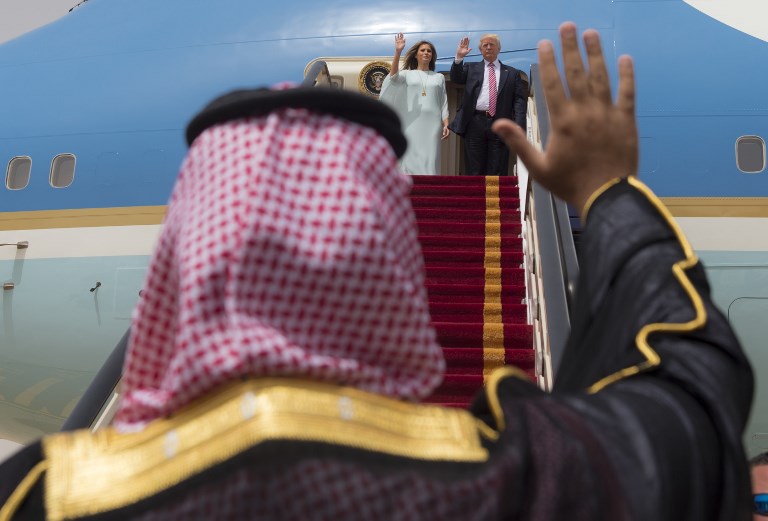MESA’s architecture to take shape in Washington

Washington will on Wednesday host an important meeting to put together the political and security frameworks for the Middle East Strategic Alliance (MESA). Last month, a similar exercise was completed for the economic and energy components of the new alliance.
The formation of MESA was agreed in principle in May 2017 during US President Donald Trump’s visit to Saudi Arabia, where he met with Gulf Cooperation Council (GCC) leaders and more than 50 high-ranking officials from the Arab and Islamic worlds in an unprecedented US-Islamic summit. The Riyadh Declaration, issued at the conclusion of the summit on May 21, 2017, announced the intention to establish MESA in Riyadh.
At the time, few paid attention to the announcement and those who did dismissed the alliance as “far-fetched.” Subsequent regional developments made the idea more remote. Nevertheless, preparatory work diligently continued to bring MESA to life.
Last September, the foreign ministers of the six GCC member states, plus Egypt, Jordan and the US, met in New York to discuss the formalities of the new alliance. It was agreed that it would have wide-ranging objectives: To advance prosperity, security and stability in the region.
MESA is anchored around the GCC, an idea that US officials and others have reiterated several times, so that the alliance would not start from square one but would utilize the frameworks already developed, especially the Strategic Cooperation Forum, which was established at ministerial level in 2012, and the GCC-US Strategic Partnership, established in May 2015 and re-energized by Trump and the GCC leaders in 2017. Those frameworks include specialized teams in every area of strategic importance, in addition to meetings of ministers and heads of state.
According to the current formulations, MESA has four pillars: Political, security, economic, and energy cooperation. Specialized teams have been set up to work out operational details in preparation for another summit that is expected to take place in the first half of 2019. Energy and economic specialists met in Muscat in January and, during 2018, the nine countries of MESA met to discuss, in general terms, a number of security issues. By contrast, this week’s Washington discussions are going to be more concrete, detailed, and with specific deliverables.
MESA’s main objectives are defensive: To deter and defend against outside aggression and meddling. In the security area, it is meant to preserve sovereignty and territorial integrity, promote adherence to international norms, and protect international waterways and safeguard freedom of navigation. It aims to enhance cybersecurity, prevent the proliferation of weapons of mass destruction, and counter terrorism and violent extremism.
For MESA to be effective, it has to be based on the principle of collective defense, explicitly stating that the security of the group is indivisible and that an attack against one ally is considered as an attack against all
Abdel Aziz Aluwaisheg
The alliance plans to promote economic integration between its members, including a free trade agreement in the long run, and diversification. It will also promote energy integration and diversification.
The Washington summit is expected to focus on the security and political pillars. Regarding security, MESA will seek to agree on concrete and practicable steps to achieve its security goals. On the political pillar, it is aiming to reach an agreement to outline its governance structure and manage relationships with other governments and organizations.
To achieve speedy results and maintain a robust mandate for MESA, it would be better to develop the main documents with the help of a small core group of countries or individuals, which could later be discussed by the whole membership.
The big question that many in the region ask is what sort of long-term commitment is the US ready to make? Over the years, the US has made fairly strong statements about its commitment to Gulf security. However, because those statements were not part of a formal agreement, they were viewed in the region as temporary and non-binding. In the past, US hesitation about expressing its commitment in formal terms made America’s friends and allies uncertain about its readiness to defend them. But the Trump administration has been quite forceful in expressing its commitment to regional security and has expressed its readiness to consider formal commitments.
For these reasons, and in fact for MESA to be effective, it has to be based on the principle of collective defense, explicitly stating that the security of the group is indivisible and that an attack against one ally is considered as an attack against all. This principle is based on Article 51 of the UN Charter, which refers to the right of collective self-defense and allows for countries to work in groups to safeguard regional security. It is also implied in Chapter 8 of the UN Charter, which encourages regional cooperation in all areas.
With a formal agreement, the MESA framework would be robust enough to allow its members to count on each other, not only in collective security but also in economic partnership and political coordination. In the agreement, the parties would negotiate the collective principles underpinning the agreement and set the conditions where the agreement could be triggered.
In addition to the legal basis of the MESA security arrangements, political consensus is needed within the group to gird and secure those arrangements. Regular consultations are needed on the region’s political issues, including Syria, Yemen, Iraq and Libya, with the aim of preventing terrorist groups and outside meddling from derailing the political processes needed to heal those broken states.
• Abdel Aziz Aluwaisheg is the Gulf Cooperation Council (GCC) assistant secretary-general for political affairs and negotiation, and a columnist for Arab News. The views expressed in this piece are personal, and do not necessarily represent those of the GCC. Twitter: @abuhamad1










































